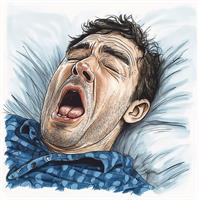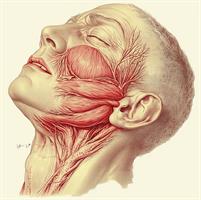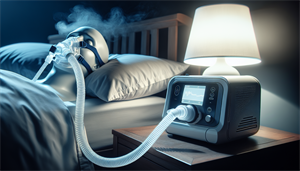Mucus buildup in the airways can indeed be a significant cause of snoring. When excessive mucus accumulates in the nasal passages or throat, it creates a physical blockage that forces air to pass through narrower channels, leading to vibrations that produce the sound of snoring.
This article explores the relationship between mucus and snoring, what triggers mucus production, and how you can alleviate snoring caused by mucus.
What Causes Mucus to Accumulate?
Mucus is produced by your body to trap and remove foreign particles, bacteria, and viruses. However, certain conditions can cause an overproduction of mucus, leading to congestion and airway blockages. These conditions include:
1. Colds and Respiratory Infections
When you're sick, your body produces more mucus to help flush out pathogens. Unfortunately, this increased mucus production can clog your nasal passages and throat, leading to nighttime snoring.
2. Allergies
Seasonal allergies, dust, and pet dander can cause inflammation in the nasal passages, which increases mucus production. Many people with allergic rhinitis experience snoring due to blocked nasal airways.
3. Sinus Infections (Sinusitis)
A sinus infection can cause thick, sticky mucus to block nasal passages, making it difficult to breathe through your nose, which often leads to mouth breathing and snoring.
4. Post-Nasal Drip
When mucus drips down from the nasal passages into the throat, it can obstruct the airway and make snoring worse. This is common in individuals with chronic sinus problems or allergies.
How Mucus Causes Snoring
When air cannot pass freely through the nasal passages, the body compensates by forcing it through the mouth. This shift in airflow creates vibrations in the soft tissues of the throat, resulting in snoring. Here’s how mucus can contribute:
- Nasal Congestion: Excessive mucus clogs the nasal passages, reducing airflow and forcing you to breathe through your mouth.
- Throat Irritation: Mucus buildup in the throat can cause swelling of the tissues, narrowing the airway.
- Obstructed Airways: Mucus that collects in the back of the throat can block the airway, making snoring more likely.
Symptoms of Mucus-Induced Snoring
You may experience mucus-related snoring if you notice:
- Nasal Congestion: Difficulty breathing through your nose due to stuffiness.
- Mouth Breathing: You wake up with a dry mouth or sore throat from breathing through your mouth while sleeping.
- Post-Nasal Drip: A constant feeling of mucus in the back of your throat, especially when lying down.
Tips to Reduce Mucus and Alleviate Snoring
If mucus is causing you to snore, there are several remedies you can try to reduce mucus production and open your airways for better sleep.
1. Stay Hydrated
Drinking plenty of fluids helps to thin the mucus, making it easier for your body to clear it out of your airways. Aim for 8-10 glasses of water a day to stay properly hydrated.
2. Nasal Irrigation
Using a saline spray or a neti pot can help flush out excess mucus from your nasal passages, reducing congestion and improving airflow. This method is particularly helpful if your snoring is related to a cold or allergies.
3. Steam Inhalation
Inhaling steam from a hot shower or a bowl of hot water can help to loosen and clear mucus from the nasal passages. Add essential oils like eucalyptus or peppermint for additional relief.
4. Use a Humidifier
Dry air can irritate your nasal passages and throat, leading to increased mucus production. A humidifier adds moisture to the air, helping to soothe irritated tissues and reduce mucus buildup.
5. Elevate Your Head While Sleeping
Sleeping with your head elevated can help prevent mucus from pooling in your throat and reduce the likelihood of snoring. Use an extra pillow or invest in an adjustable bed to keep your head raised.
6. Treat Underlying Allergies
If allergies are the cause of your mucus buildup, consider using antihistamines or nasal corticosteroids to manage symptoms. Reducing allergic reactions can decrease mucus production and improve airflow.
7. Avoid Dairy Before Bed
Dairy products can thicken mucus in some individuals, making snoring worse. Try avoiding dairy in the evening to see if it reduces your snoring.
When to See a Doctor
If snoring persists despite trying home remedies, it may be time to consult a healthcare professional. Chronic snoring can be a symptom of underlying health issues, such as sleep apnea, which requires medical attention. Here are some signs that you should seek help:
- Loud, Chronic Snoring: If your snoring is loud and frequent, it could be a sign of sleep apnea or other health concerns.
- Sleep Disturbances: If you wake up gasping for air or feel fatigued during the day despite a full night's sleep, see a doctor.
- Persistent Congestion: Long-term mucus buildup could indicate sinusitis, nasal polyps, or another condition that needs medical treatment.
Snoring and Sleep Apnea
While mucus can cause snoring, it’s essential to differentiate between regular snoring and obstructive sleep apnea (OSA). OSA occurs when the airway becomes fully blocked during sleep, causing repeated interruptions in breathing. People with OSA may wake up several times during the night gasping for air. If mucus is causing snoring along with symptoms of sleep apnea, like pauses in breathing or excessive daytime fatigue, consult a sleep specialist for a proper diagnosis and treatment plan.
Conclusion
Mucus is a common cause of snoring, especially when it's related to colds, allergies, or sinus infections. Reducing mucus buildup with methods like nasal irrigation, steam inhalation, and hydration can significantly improve airflow and reduce snoring. However, if your snoring persists or worsens, it’s essential to seek medical advice to rule out more serious conditions like sleep apnea. By addressing mucus and managing your airway health, you can enjoy a better night’s sleep for both you and your partner.



